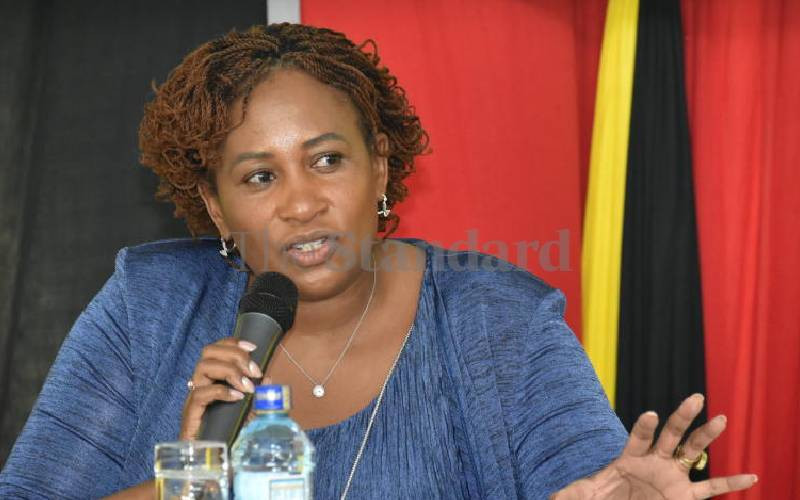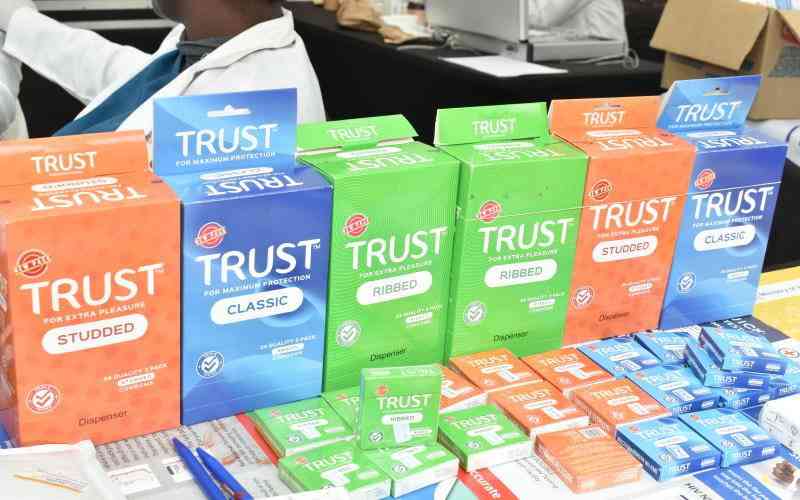Passion drives her advocacy. Boldness maintains it.
These twin values have encouraged Dr Wambui Waithaka to carry on with a course that has many turning their faces the other side in shyness, rubbing their eyes in embarrassment when she runs her weekly health promotion online campaign. On Condoms!
But hers is a bigger one than discussing condoms at online platforms.
“The C-word is a subject we need to discuss alongside other health policies and laws like The Reproductive Health Care Bill 2014 and dispel myths whether we plan to dish out contraceptives like sweets to every adolescent within sight,” she says.
Dr Waithaka’s love for reproductive health has seen her wear different hats on varied occasions in order to pass across prevention messages.
She has weathered the storms so far and bears the precarious task of urging Kenyans to speak about reproductive health rights.
But what makes her an interested party in the rally for a law that will regulate both policy and practise of quality care for both the unborn and mother during pregnancy and thereafter?
Health advocate
She self-describes as a female of reproductive age, a health practitioner, mother, sister, daughter and a health advocate thus making her a stakeholder in this controversial debate.
Dr Waithaka works as a medical officer at Pumwani Maternity Hospital, she is the National Treasurer at the doctors and dentists lobby, KMPDU, and is a social media health advocate on condoms.
She is the face behind the Twitter campaign #CondomFriday that aims at providing catchy, yet relevant information on condoms.
But why condoms on Friday?
“I began posting facts on condoms every Friday and it created interest and counter remarks and I hashtagged it as #CondomFriday,” Dr Waithaka said in an interview.
She notes that Kenya is a conservative society that is shy to speak about attitudes that predispose us to unplanned pregnancies and Sexually Transmitted Infections that are haunting us. “They have been tagged as uncomfortable and inappropriate conversations.”
“One #CondomFriday morning when I started posting messages on condoms, one of my followers commented that ‘it’s too early Daktari’ yet STIs are a source of of misery, illness and death,” she says.
Stay informed. Subscribe to our newsletter
The second child in a family of three, Dr Waithaka and her siblings were brought up in a strict Catholic family and personally believes that Catholics should not shy away from discussions and use of condoms if it will save lives and prevent new and re-infections.
Legitimate campaign
“I have been accused of promoting sex but mine is a legitimate campaign as a health professional and not for flimsy social reasons that will not bring down the infections,” she says.
Her internship days at Kenyatta National Hospital, Dr Waithaka says, fuelled her passion in reproductive health advocacy and she made it a mantra to fight for the provision of better maternal and child care in the country.
“I once took care of a 15-year old who was admitted at KNH with complications after a backstreet abortion went wrong and during the treatment and management she kept yelling out ‘Mummy, Mummy. That showed she was still quite young to be going through all that trauma,” she remembers.
That she supports nominated Senator Judith Sijeny in the discussion and adoption of The Reproductive Health Care Bill 2014 is no secret. She cites it as a ripe moment for Kenya to have a law that extensively guarantees reproductive health rights for all within its borders.
“Calm down people! No-one is terminating pregnancies in any of the health facilities. The proposed Bill is safe,” she challenges those who are against the proposed RH law. And she is disappointed that given the modern gains in healthcare, maternal health is stagnantly below par considering the number of illnesses and deaths in Kenya.
However, she acknowledges that Free Maternity Healthcare was an impactful policy decision that has seen more women deliver in hospitals, something they could not do before that policy.
But there are some gaps.
She describes the Kenyan health system as one that is both shocked and chocked by various health matters and which forgets that women have difficulty in accessing maternity care and lack knowledge on reproductive health, amongst other problems.
“No one is asking the women why they aren’t delivering in hospitals, talking to the adolescents and youth about reproductive health or establishing the causes of deaths of women during childbirth.”
She believes that the current debate on the Reproductive Health Bill has been taken out of context and rendered an emotive issue especially when it comes to Reproductive Health of Adolescents as outlined in Section Nine.
“We have focused all our energies on public discussions on adolescents and contraceptives yet the Bill also outlines surrogacy laws that giving couples the opportunity to have children,” she says. “This has not been highlighted in the current debates. We want to concentrate on condoms and adolescents and lead to deception and confusion.”
Surrogate mother
Surrogacy is defined as the practice by which a woman (called a surrogate mother) becomes pregnant and gives birth to a baby in order to give it to someone who cannot have children.
The Bill, she says, seeks to protect the mother and her child, the health practitioner attending to the mother, adolescents and the youth. It does not seek to erode our moral fibre “but societal dynamics have changed and we need to discuss condoms, sex and other RH aspects within the right space and time.”
“The Bill will not allow situations where maths or geography lessons will be interrupted and students taught about contraceptives. “We are health experts with ethical grounding,” she says, unrepentantly.
She, however, adds that societal structures which ensured that pupils and students went upcountry and were given talks by aunts, uncles and grandparents about their bodily changes and how to behave are fading away.
“The biggest source of such information is from peers, mass media and social networking sites and calls for parents to begin talking to their children from eight to 13 years,” Dr Waithaka says, noting that if ‘THE TALK’ does not happen at that age, other sources might give the child information that may not be age-appropriate.
She further dispels rumours and street talk that condoms and other contraceptives will be handed to adolescents and youth like candy and says the Bill allows referrals to more qualified persons who deal with reproductive health matters of adolescents and the youth.
“The Youth and Adolescent Clinics are run by qualified, trained and experienced nurses who do not just give contraceptives to anyone,” she clarifies, adding that these will only be issued when the adolescent visits the clinic for reproductive health services.
Parental consent
She justifies part of the Bill that spells that there are instances where parental consent will be required considering that in Pumwani hospital, 9 out of 10 of the underage girls who deliver there are orphans as well as being poor. They do not have the privilege of parental guidance and consent at adolescent clinics.
“Whom will you ask for consent in the case of a 16-year old married Samburu girl on her fourth child who feels she has reached the desired family size or wishes to space her children? she poses, presenting the dilemma in most deliveries.
She points out that the youth and adolescents should be granted these rights which are defined as the provision of the highest standard of sexual and reproductive health and to make informed decisions regarding their lives, free from discrimination, coercion or violence.
“We make decisions to give contraceptives on case by case basis, but we provide reproductive health information to all youth and adolescents who come to the clinic,” Dr Waithaka says, and adds that abstinence is among the key messages given to these two vulnerable groups, and they can make decisions based on their risk levels.
“Giving contraceptives should not be equated with abortion,” she disclaimed. “The Bill allows only trained professionals at Adolescent Health clinics to issue contraceptives. Not everyone as the naysayers want us to believe.”
In her blog, which has received plaudits for health advocacy and being a critical source of health information, she writes that “sexual health is not an event. It is a series of life choices. Unfortunately sexual health is not only personal but public.”
When it comes to defending condoms, Dr Waithaka does not mince her words. “Hiding behind cultural tags will increase HIV infections and work against current campaigns such as Getting to Zero,” she says.
“Condoms are a choice and a tool for sexual health. If used correctly and consistently, they are a good place to start,” she adds in her blog.
“As long as men and women live in this society, there will be sexual relations that will lead to pregnancies and children; sometimes to infections in cases of having multiple partners and engaging in unprotected sex. Those who try to procure abortions could get complications which could lead to deaths.”
She says “our respective African cultures had places and spaces to talk about sex but sadly this has been diluted by the changing social scene yet diseases are killing more people as we continue to ignore their new transmission patterns.”
As she speaks, one can easily tell she is appalled that “we have made it ‘shameful’ to discuss sex during the day yet it is killing us by night.”
She says her father belongs to a different school of thought and maintains that provision of contraceptives for adolescents and youth should not be legislated.
Father and daughter have had these difficult conversations and she acknowledges that families need to have such candid talks, even when they do not share the same ideologies.
Does her mother share on this controversial topic?
“Mum says that adolescents have no business having sex. They should be studying, praying and abstaining.”
These lively yet controversial discussions with her parents and her brother who is a chef and her sister who works in supply chain management, she says enriches the debates on ways of handling such dilemmas.
“We all need to have candid discussions on reproductive health!” she concludes
 The Standard Group Plc is a
multi-media organization with investments in media platforms spanning newspaper
print operations, television, radio broadcasting, digital and online services. The
Standard Group is recognized as a leading multi-media house in Kenya with a key
influence in matters of national and international interest.
The Standard Group Plc is a
multi-media organization with investments in media platforms spanning newspaper
print operations, television, radio broadcasting, digital and online services. The
Standard Group is recognized as a leading multi-media house in Kenya with a key
influence in matters of national and international interest.
 The Standard Group Plc is a
multi-media organization with investments in media platforms spanning newspaper
print operations, television, radio broadcasting, digital and online services. The
Standard Group is recognized as a leading multi-media house in Kenya with a key
influence in matters of national and international interest.
The Standard Group Plc is a
multi-media organization with investments in media platforms spanning newspaper
print operations, television, radio broadcasting, digital and online services. The
Standard Group is recognized as a leading multi-media house in Kenya with a key
influence in matters of national and international interest.









